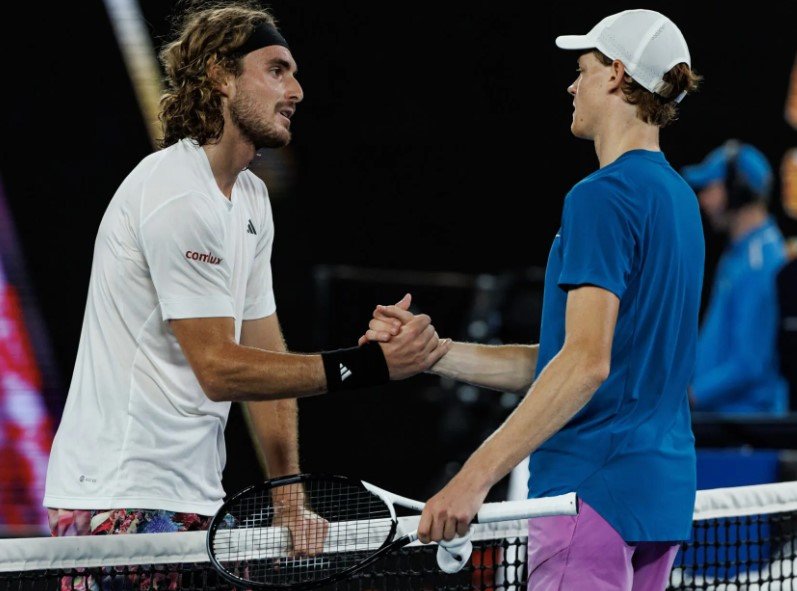Greek Star Pulls Out After High-Profile Slam Match, Sparking Talks on Player Schedules and Pay
Stefanos Tsitsipas will not be competing at this week’s Vienna Open, just days after pocketing £1.1 million for a single match at the Six Kings Slam. The Greek star’s decision comes amid mounting speculation over player commitments and scheduling priorities in professional tennis.
Tsitsipas, a two-time Grand Slam finalist, faced Italy’s Jannik Sinner in a high-stakes opening-round match at the Six Kings Slam. Despite his loss in straight sets over 76 minutes, the payout has drawn attention, highlighting how appearance fees in tennis can sometimes eclipse match results.
A Million-Pound Match and the Math Behind It
The figures are staggering. Tsitsipas earned £1.1 million for just over an hour of play, averaging roughly £14,473 per minute on the court. For fans and pundits alike, it’s a striking reminder of how top-tier tennis operates financially, where star power can sometimes outweigh performance.
-
Some critics have questioned whether such lucrative appearance fees could affect player motivation.
-
Others argue it reflects the market value of drawing spectators and media attention, which can be enormous for tournaments like the Six Kings Slam.
| Player | Match Duration | Result | Appearance Fee | Earnings per Minute |
|---|---|---|---|---|
| Stefanos Tsitsipas | 76 minutes | Lost in Straight Sets | £1,100,000 | £14,473 |
Tsitsipas’ fee reportedly includes both a guaranteed appearance amount and promotional commitments tied to his marketability. For tournaments, securing top-ranked names can boost ticket sales, sponsorships, and broadcast ratings, making the expense worthwhile even if the player exits early.

The Vienna Open Withdrawal
The Vienna Open had been scheduled as Tsitsipas’ next stop on the ATP tour. However, he pulled out hours before his first-round match. No official reason was immediately disclosed, though insiders suggest fatigue or strategic rest could have influenced the decision.
Tsitsipas has now withdrawn from his third tournament in recent weeks, fueling discussions around the modern tennis calendar and player burnout. Fans have reacted with a mix of frustration and understanding, with some noting that the grueling tour schedule leaves little room for recovery, particularly for players competing at multiple high-stakes events.
Scheduling Strain and Player Health
Professional tennis players often face a relentless cycle of travel, practice, and competition. The demands of the ATP tour mean that top players are balancing the pursuit of ranking points with the need to maintain physical and mental health.
-
Injury prevention is a priority. Experts warn that overplaying can lead to long-term setbacks.
-
Strategic withdrawals are increasingly common among elite players who prioritize Grand Slam performance over smaller tournaments.
Tsitsipas’ decision highlights this delicate balance. While fans might be disappointed at missing the opportunity to see him live in Vienna, the move underscores the human side of elite sports: even the biggest names need to manage their energy and careers wisely.
Financial Incentives and Modern Tennis Economics
The £1.1 million earned by Tsitsipas for a single match brings attention to tennis’ evolving economics. Appearance fees, sponsorship contracts, and bonuses now constitute a significant portion of a top player’s income, sometimes rivaling winnings from multiple tournaments.
Analysts note:
-
For marquee events, a star player’s presence can influence local economies, hotel bookings, and media coverage.
-
Players’ decisions to play or withdraw increasingly weigh not just ranking points, but financial and personal factors.
For Tsitsipas, the balance seems clear. The payoff from the Six Kings Slam was substantial enough to allow a period of rest without immediate financial concern. While some fans might grumble about missing the Vienna Open, others see it as a savvy career move—protecting longevity and ensuring readiness for future Grand Slams.
What Fans and the ATP Might Expect
The ATP and tournament organizers continue to navigate these withdrawals, as player availability impacts draw strength and ticket sales. Meanwhile, fans must adjust to the reality that elite athletes, even those as charismatic as Tsitsipas, operate in a world of careful planning and financial calculations.
His next official appearance remains uncertain. Tennis enthusiasts will be watching closely to see how he balances rest, training, and strategic participation as the season heads toward its final majors. The Vienna Open, while missing one of its biggest stars, will still proceed, but the absence serves as a reminder of the pressures that come with life at the top of the sport.








